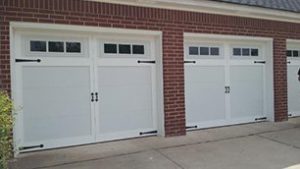Comprehending the Usual Issues That Can Impact Your Garage Door Performance
Comprehending the usual concerns that can influence your garage door performance is important for maintaining both safety and operational performance. Factors such as misaligned tracks, damaged sensors, and spring malfunctions can result in a variety of issues, from unanticipated reversals to considerable safety risks. Noisy procedure may indicate underlying mechanical concerns, while remote control failures can restrain ease of access. Determining these problems early is crucial, yet several property owners remain unaware of the signs. What preventative actions can be required to ensure your garage door remains in optimum problem?
Misaligned Tracks
Misaligned tracks can dramatically impede the performance of a garage door, causing functional ineffectiveness and possible safety threats. When the tracks that guide the door are misaligned, the door might come to be challenging to shut or open up, triggering excessive stress on the door's parts and potentially resulting in early wear or failure.
A number of aspects can add to track imbalance, consisting of physical obstructions, deterioration over time, or improper installation. Sun City West Garage Maintenance. Also small variances can affect the door's operation, bring about uneven activity or jamming. In many cases, a misaligned track can cause the door to disengage from its rollers, positioning a severe security threat to onlookers and users
Homeowners should routinely inspect the tracks for debris and guarantee that mounting hardware is safe and secure. Addressing misaligned tracks not only enhances the capability of the garage door but also expands its life-span, making certain a trusted and risk-free procedure for years to come.
Faulty Sensors
When garage door sensing units breakdown, they can disrupt the whole procedure of the door, bring about safety concerns and ease problems. These sensors are developed to spot challenges in the door's course, guaranteeing that the door reverses if something remains in the means. A faulty sensing unit may not react properly, resulting in the door shutting all of a sudden or failing to close entirely.
Usual sources of sensor malfunction include dirt or particles blocking the sensing unit's lens, misalignment of the sensors, or damages to the wiring. Routine upkeep, such as cleaning up the sensing unit lenses and examining their alignment, can help alleviate these concerns. It might be necessary to replace them. if the sensors are constantly malfunctioning in spite of upkeep.
To identify sensor troubles, observe the door's behavior throughout operation. The sensing units may be at fault if the door turns around without obstruction or fails to shut or open. It is vital to deal with these concerns quickly, as malfunctioning sensing units present a danger of injury or residential property damages. Consulting a specialist specialist for a complete assessment and fixing can ensure the safe and effective operation of your garage door.
Spring Issues
Garage door performance can likewise be endangered by problems with the springtimes, which are essential parts accountable for reversing the weight of the door. These springs carry the ball of the door's weight, facilitating smooth opening and closing. In time, springtimes can experience wear and tear, bring about different problems such as decreased tension or full failure.
One usual concern is the weakening or extending of torsion springs, which might cause the garage door coming to be unbalanced. This can cause the door to relocate erratically or fall short to open entirely. Extension springtimes, on the other hand, may damage or come to be separated, positioning safety threats as they can snap back with substantial pressure.

Noisy Operation
Noisy procedure of a garage door can be an irritating experience for home owners, typically showing underlying mechanical concerns. Common root causes of noise include damaged rollers, loose hardware, or insufficient lubrication. In time, the metal parts of the door system can weaken, resulting in enhanced friction and sound throughout operation.
One frequent perpetrator is the rollers. If they are used or damaged, they can develop a squeaking or grinding audio as the door relocates along the track. In addition, loose screws or screws can click here to read generate rattling sounds, which may disrupt the smooth procedure of the door. Ensuring that all see here components are tightened and secure is essential for preserving a silent system.
Inadequate lubrication on the relocating parts can aggravate noise issues. Consistently applying a silicone-based lube to joints, tracks, and rollers can considerably minimize friction and noise, improving general performance.
In many cases, the garage door opener itself may be the source of the noise, commonly due to imbalance or mechanical wear. Dealing with these variables promptly can result in a quieter and a lot more reliable garage door operation, boosting both ease and the life-span of the system.

Remote Control Troubles
A typical issue that many homeowners encounter is the malfunctioning of garage door remote controls. Usually, the initial step in troubleshooting is to check the batteries in the remote.
An additional possible reason for remote control issues is disturbance from other digital devices. Usual family items such as cordless phones, Wi-Fi routers, and even neighboring garage doors can interfere with the signal in between the remote and the opener. If interference is suspected, transforming the remote's frequency or relocating the opener may be essential.
In many cases, the problem might exist within the remote itself. Physical damages, such as splits or water exposure, can provide the remote faulty. If damage is thought, a replacement may be called for.
Lastly, make sure that the garage door opener is functioning appropriately. It may not react to remote signals no matter of the remote's condition if the opener is malfunctioning. Regular maintenance and periodic read this article checks can help protect against these concerns and ensure smooth operation.
Conclusion
In conclusion, the performance of garage doors is affected by numerous common concerns, including misaligned tracks, damaged sensing units, springtime issues, noisy procedures, and remote breakdowns. Addressing these worries with routine maintenance and timely fixings is crucial for guaranteeing optimum functionality and safety. By understanding these prospective problems, house owners can take positive measures to boost the reliability of their garage doors and avoid more significant complications in the future.
When garage door sensing units breakdown, they can interfere with the whole procedure of the door, leading to safety and security concerns and comfort problems. These sensors are created to identify obstacles in the door's path, making certain that the door turns around if something is in the means.Garage door efficiency can likewise be jeopardized by issues with the springtimes, which are crucial parts liable for counterbalancing the weight of the door.An usual issue that numerous home owners encounter is the malfunctioning of garage door remote controls.In final thought, the efficiency of garage doors is influenced by different usual concerns, consisting of misaligned tracks, defective sensing units, springtime problems, loud operations, and remote control malfunctions.